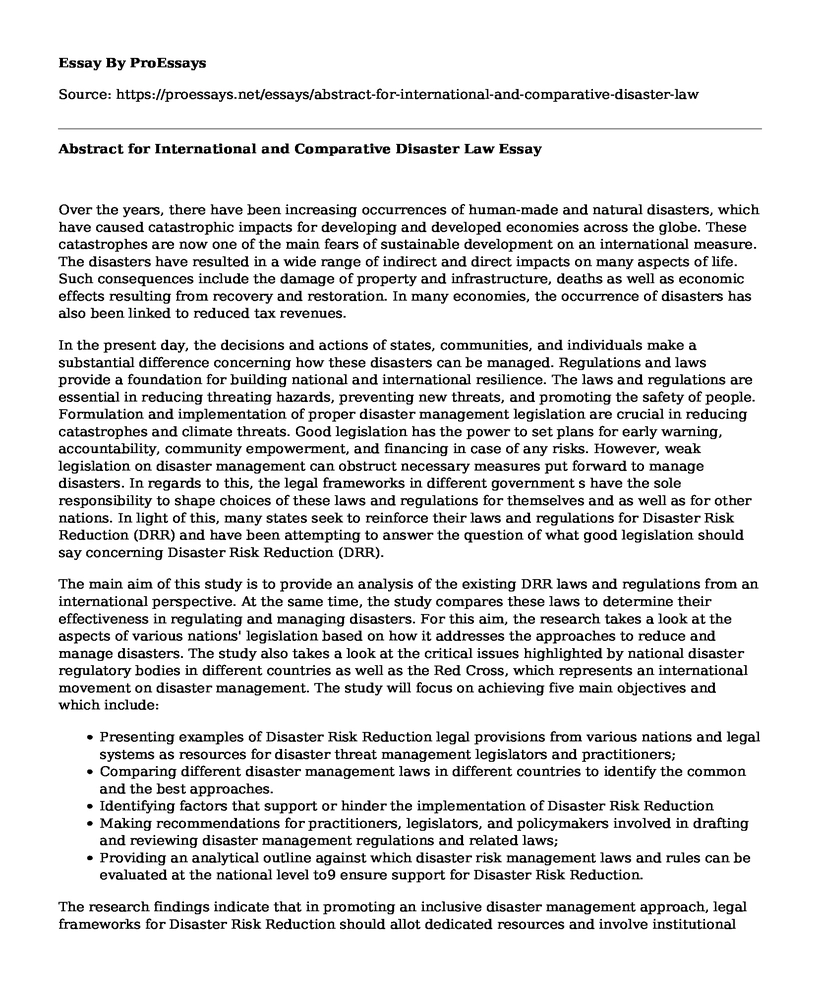Over the years, there have been increasing occurrences of human-made and natural disasters, which have caused catastrophic impacts for developing and developed economies across the globe. These catastrophes are now one of the main fears of sustainable development on an international measure. The disasters have resulted in a wide range of indirect and direct impacts on many aspects of life. Such consequences include the damage of property and infrastructure, deaths as well as economic effects resulting from recovery and restoration. In many economies, the occurrence of disasters has also been linked to reduced tax revenues.
In the present day, the decisions and actions of states, communities, and individuals make a substantial difference concerning how these disasters can be managed. Regulations and laws provide a foundation for building national and international resilience. The laws and regulations are essential in reducing threating hazards, preventing new threats, and promoting the safety of people. Formulation and implementation of proper disaster management legislation are crucial in reducing catastrophes and climate threats. Good legislation has the power to set plans for early warning, accountability, community empowerment, and financing in case of any risks. However, weak legislation on disaster management can obstruct necessary measures put forward to manage disasters. In regards to this, the legal frameworks in different government s have the sole responsibility to shape choices of these laws and regulations for themselves and as well as for other nations. In light of this, many states seek to reinforce their laws and regulations for Disaster Risk Reduction (DRR) and have been attempting to answer the question of what good legislation should say concerning Disaster Risk Reduction (DRR).
The main aim of this study is to provide an analysis of the existing DRR laws and regulations from an international perspective. At the same time, the study compares these laws to determine their effectiveness in regulating and managing disasters. For this aim, the research takes a look at the aspects of various nations' legislation based on how it addresses the approaches to reduce and manage disasters. The study also takes a look at the critical issues highlighted by national disaster regulatory bodies in different countries as well as the Red Cross, which represents an international movement on disaster management. The study will focus on achieving five main objectives and which include:
- Presenting examples of Disaster Risk Reduction legal provisions from various nations and legal systems as resources for disaster threat management legislators and practitioners;
- Comparing different disaster management laws in different countries to identify the common and the best approaches.
- Identifying factors that support or hinder the implementation of Disaster Risk Reduction
- Making recommendations for practitioners, legislators, and policymakers involved in drafting and reviewing disaster management regulations and related laws;
- Providing an analytical outline against which disaster risk management laws and rules can be evaluated at the national level to9 ensure support for Disaster Risk Reduction.
The research findings indicate that in promoting an inclusive disaster management approach, legal frameworks for Disaster Risk Reduction should allot dedicated resources and involve institutional mandates. The legal frameworks could also encourage the participation of vulnerable groups, community, and civil society as well as establish accountability and responsibility of the relevant players. Active structures ensure that Disaster Risk Reduction measures become sustainable at an international level where the availability of resources is guaranteed.
Cite this page
Abstract for International and Comparative Disaster Law. (2022, Mar 28). Retrieved from https://proessays.net/essays/abstract-for-international-and-comparative-disaster-law
If you are the original author of this essay and no longer wish to have it published on the ProEssays website, please click below to request its removal:
- Research Paper Example on Internet Addiction
- The Use of Assessment Health Tools Paper Example
- Analysis of the Public Health Policy From an Ethical Perspective
- Paper Example on Blunt Force Injuries
- Teaching Students Who Is Hard of Hearing Paper Example
- Essential Resuscitation Equipment and Drugs for In-Hospital Cardiopulmonary Arrests - Essay Sample
- Essay Example on Abortion Debate: Pro-Choice and Pro-Life Views in 2021







